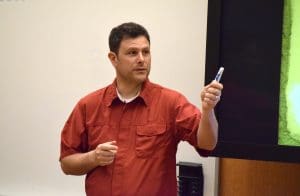Webinar: Regenerative Justice, Beyond Restoring
Join us in our conversation on Regenerative Justice, Beyond Restoring by Dr. Toran Hansen on Thursday, January 9, 2020, at 2:00 PM ET. In this webinar, Dr. Hansen will outline a new form of justice originating in humanistic and existentialist scholarly traditions, called regenerative justice.
Regenerative justice blends restorative justice with generative justice, which involves helping participants in victim-offender conferencing sessions to build new positive life meanings, particularly meanings have with wrongdoing itself and the process of “making things right,” in order to enable them to better cope with new life circumstances and pursue a more peaceful life path moving forward. The notion of regenerative justice therefore can make the practice of restorative justice more future-oriented, strengths-based, and provide a much broader context for discussing meeting the needs of conference participants and the repairing harm. However, this looks very different for survivors, perpetrators, and community members, but regenerative justice has something to offer everyone. The practice of Logotherapy, coming from the work of the Psychologist Viktor Frankl, informs this analysis and provides practical strategies to facilitate the meaning-building process. We will therefore explore both the theory of regenerative justice, as well as practical guidelines to bring this unique for of practice to life. The significance of regenerative justice is that the practice of restorative justice can be enriched, with practitioners going beyond current practice limitations. It might be particularly important in cases where restorative justice practice is inhibited. For instance, in cases where one of the principle parties cannot participate (either the victim or offender), in more therapeutic applications (like in cases of severe violence), in postwar societies where justice is elusive, and when working with clients that seek deeper meanings out of restorative processes, the generative component of justice may be even more important.
Dr. Toran Hansen is an Adjunct Professor in the Department of Conflict Analysis and Dispute Resolution at Salisbury University, where he was previously the Director of the Graduate Program and an Associate Professor. Prior to that, he was an Assistant Professor at Nova Southeastern University’s Department of Conflict Analysis and Resolution, in Florida. He earned his PhD in Social Work from the University of Minnesota and a Master’s degree in Conflict Analysis and Resolution from Nova Southeastern University. Toran has been a victim-offender mediator in cases of severe violence for the Minnesota Department of Corrections and the Palm Beach County Courthouse, as well as a caseworker with moderate to high-risk youth in Canada. In addition to evidence-based practice, Toran has research interests in restorative, transitional, and social justice, conflict transformation, peace, and approaches to dialogue. He has written scholarly articles and chapters on a variety of subjects related to these interests including: regenerative justice, victim-offender (humanistic) mediation, truth and reconciliation commissions, critical approaches to conflict resolution, narrative mediation, inter-organizational network facilitation, community organizing in social movements, social capital, holistic peace, and, of course, evidence-based conflict management practice. He is the author of The Generalist Approach to Conflict Resolution.
is an Adjunct Professor in the Department of Conflict Analysis and Dispute Resolution at Salisbury University, where he was previously the Director of the Graduate Program and an Associate Professor. Prior to that, he was an Assistant Professor at Nova Southeastern University’s Department of Conflict Analysis and Resolution, in Florida. He earned his PhD in Social Work from the University of Minnesota and a Master’s degree in Conflict Analysis and Resolution from Nova Southeastern University. Toran has been a victim-offender mediator in cases of severe violence for the Minnesota Department of Corrections and the Palm Beach County Courthouse, as well as a caseworker with moderate to high-risk youth in Canada. In addition to evidence-based practice, Toran has research interests in restorative, transitional, and social justice, conflict transformation, peace, and approaches to dialogue. He has written scholarly articles and chapters on a variety of subjects related to these interests including: regenerative justice, victim-offender (humanistic) mediation, truth and reconciliation commissions, critical approaches to conflict resolution, narrative mediation, inter-organizational network facilitation, community organizing in social movements, social capital, holistic peace, and, of course, evidence-based conflict management practice. He is the author of The Generalist Approach to Conflict Resolution.
Please note that the deadline to register for this webinar is one day before the event. We will send the Zoom access link to registrants after the registration closing time and again on the day of the event. For further information about this our other webinars, contact us at webinars@mediatorsbeyondborders.org.
Join us and stay updated on MBBI’s news and events.
